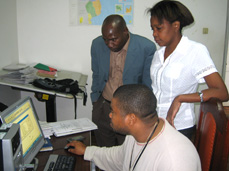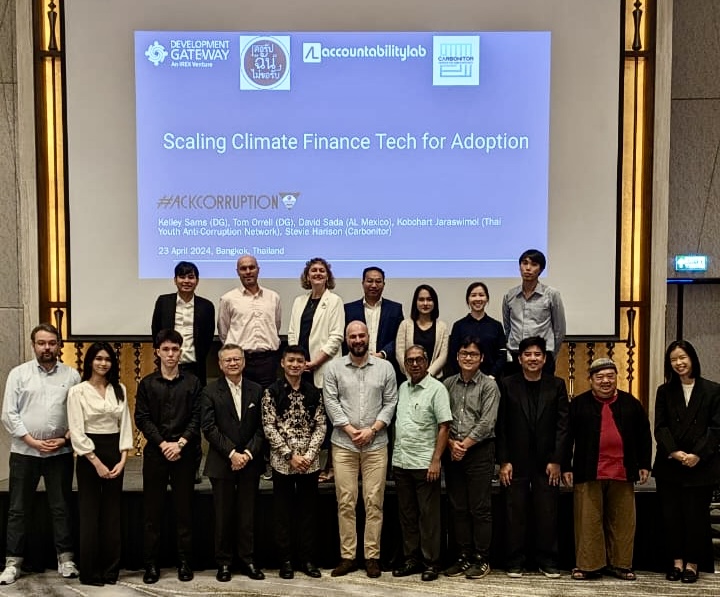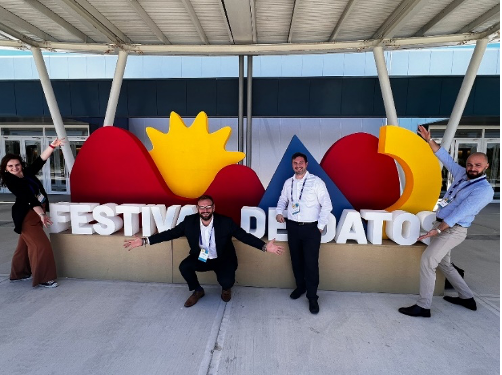E-government Project Focuses on Land
|  |
| Cremilide Mambo, director of land management of Gaza Province, center, with Elias Dique, right, project manager of the land management information system, and a technician, left, review information from the new digital application. |
Mozambique
Land, and its proper management, is a central issue in developing countries. Accurate and accessible information is a necessary requirement for rural development. It makes possible the development of land, forests, and waterways in a sustainable manner that will contribute to the elimination of poverty. The digitization of a land management system could greatly benefit a country that wants to manage its resources and help provide a living for its citizens.
Mozambique has taken that step with an electronic land information management system, part of a larger e-government initiative. After years of civil war and devastating floods, this African nation sought to create a modern and transparent land management system to better serve its countrymen and to attract foreign private investments.
In 2005, Development Gateway awarded Mozambique funding for the creation of an electronic land information management system. The project was to build on the e-government initiative already under way and constitute the first phase of a national electronic land registry. It was implemented by the Ministry of Agriculture through the National Directorate of Lands and Forest. Two years later, all 10 provincial offices of the ministry are connected. They can capture and update data in real time online with accuracy.
“This system has changed how we work,” according to Arlito Cuco, the director of the National Directorate of Lands and Forest. Previously, it was labor-intensive to manually search through a cumbersome system of files to obtain information for allocating new land. “This has helped tremendously in the decision-making process. When the system is completely and fully integrated it is going to enable us to know exactly what is available where and for what use.”
Now Mozambique has a reliable system of land information that clarifies the legal status of each land parcel, and includes information on the type of occupancy, the use, and an evaluation of soil, all with several clicks of the mouse. It has improved budgetary forecasts due to more accurate estimates of income from taxes. The system has improved decision-making by making critical information accessible even from remote locations.
An added benefit is the integration of a graphic information system that gives decision makers a comprehensive view of land parcels, essential to sustainable resource management. Across the provinces, staff can quickly generate typographical maps for any particular parcel. This could help spur investor interest.
With the completion of this pilot, the National Directorate of Lands and Forest plans to continue the program into the second phase, to give online access to land information to the people of Mozambique.
Share This Post
Related from our library

The Future of Technology Governance and Global Development: Why DG Brought DataReady In-house
DG is excited to announce we now have more robust data governance advisory services with the recent integration of DataReady.

Letting the Sunshine in: Building Inclusive, Accountable, and Equitable Climate Finance Ecosystems
In April, DG, HackCorruption, and the Thai Youth Anti-Corruption Network hosted a roundtable in Bangkok to discuss climate financing. This blog explores the main takeaway: a multi-disciplinary and multi-stakeholder approach that prioritizes local contexts, inclusive governance, transparency, accountability, and equitable distribution of resources is essential to impactful climate financing.

Developing Data Systems: Five Issues IREX and DG Explored at Festival de Datos
IREX and Development Gateway: An IREX Venture participated in Festival de Datos from November 7-9, 2023. In this blog, Philip Davidovich, Annie Kilroy, Josh Powell, and Tom Orrell explore five key issues discussed at Festival de Datos on advancing data systems and how IREX and DG are meeting these challenges.